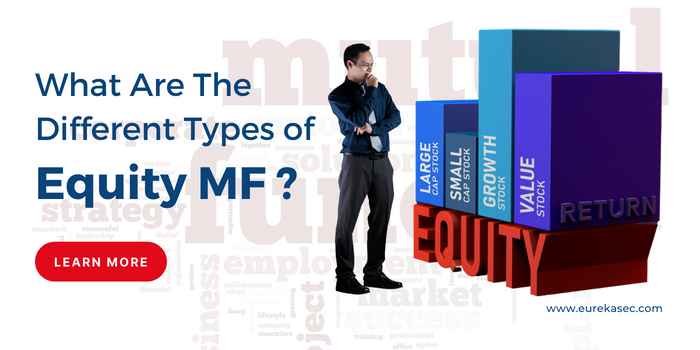
Equity Mutual Funds are Equity Based Mutual Funds that predominantly invest in stocks or shares of companies across different industry sectors. These funds are also called Growth Mutual Funds. Equity Funds are linked to higher risk when compared to other mutual fund types. There are various Types of Equity Mutual Funds based on market capitalisation. They have been discussed in detail below for your convenience.
Large Cap Funds
Large Cap Funds are Equity Mutual Funds that invest at least 80 per cent of the total assets in large-cap stocks. Large-cap stocks are stocks or shares of the top 100 companies in the stock market based on market capitalisation. Large Cap Equity Mutual Funds offer more stable returns when compared to small-cap and mid-cap Equity Funds.
Mid Cap Funds
Mid Cap Funds are Equity Based Mutual Funds that invest at least 65 per cent of the total assets in mid-cap stocks. Mid-cap stocks are stocks or shares of companies belonging to a 101-250th place in the stock market as per market capitalisation. Even though Mid Cap Equity Funds are more volatile, they still offer better returns when compared to large-cap and small-cap Equity Mutual Funds.
Small Cap Funds
Small Cap Funds are Equity Mutual Funds that invest at least 65 per cent of the total assets in small-cap stocks. Small cap stocks are stocks or shares of companies belonging to 251st place and below in the stock market as per market capitalisation. Over 95 per cent of companies in the stock market belong to this category based on market capitalisation. Small Cap Equity Mutual Funds are highly volatile but offer greater returns than Large cap and Mid cap funds.
Multi Cap Funds
Multi Cap Funds are Equity Based Mutual Funds that invest about 65 per cent of the total assets in shares of small-cap, mid-cap and large-cap companies in varied proportions. When you invest in Multi Cap Equity Mutual Fund, the fund manager regularly rebalances your portfolio to adjust to changing economic and market conditions based on your investment objective.
Large Cap and Mid Cap Funds
Large Cap and Mid Cap Funds are Equity Mutual Funds that invest around 35 per cent of total assets in the shares of large-cap companies and about 35% of total assets in the shares of mid-cap companies. The Large Cap and Mid Cap Equity Mutual Funds offer investors the ideal blend of higher returns and lower volatility.
Equity Mutual Funds can also be categorised based on investing styles. Here are different types of equity mutual funds based on different investment styles.
Dividend Yield Funds
Dividend Yield Funds are Equity Funds that invest in the shares or stocks of companies that are renowned for declaring high dividends. A company usually declares a high dividend when it makes a good profit.
Focused Funds
Focused Funds are Equity Based Mutual Funds that invest in the stocks of a maximum of 30 companies. Since the focused funds have a limited number of stocks, they have a higher concentration of risks when compared to other more diversified Equity Funds. The greatest advantage of investing in Focused Equity Mutual Funds is that if your fund manager selects the right combination of stocks, then these funds hold the potential to deliver superior alphas.
Value Funds
Value Funds are Equity Funds that are based on the value investing strategy. These Equity Mutual Funds invest in the stocks or shares of the companies that are trading on the stock market at a discount to their intrinsic value. The discount in the value of the investment is called “Factor of Safety”. Value investing is also termed contra investing. Value Equity Funds are known to yield high dividends.
Sectoral Funds and Thematic Funds
Sectoral Funds and Thematic Funds are Equity Funds that SEBI mandatorily requires to invest at least 80 per cent of its total assets in a particular theme or sector. Sectoral funds are equity-based funds that invest in one industry sector, such as technology, banking, pharmaceuticals, infrastructure, and FMCG.
Thematic Funds are Equity Funds that invest in several sectors that have a common theme. For example, the consumption theme can encompass consumer durables, consumer non-durables, banking and financial services and media and entertainment. Another example could be the healthcare theme. This theme can include sectors such as pharmaceuticals, wellness products, diagnostic centres, and hospitals.
Thematic funds have a more diversified risk than sectoral funds. However, both sectoral and thematic funds have higher sector risks when compared to diversified equity funds.
Equity Mutual Funds can also be categorised on the basis of tax benefits. Types of Equity Mutual Funds based on Tax Benefits are as follows.
Equity Linked Savings Scheme (ELSS)
ELSS Funds are Equity Funds that offer a tax benefit to the investor of up to Rs.1.5 Lakh under section 80C of the Income Tax Act. ELLS Funds invest at least 80 per cent of its total assets in equity and equity-related instruments. ELLS Schemes also have a mandatory lock-in period of 3 years.
Non-Tax Saving Equity Funds
Except for ELSS Funds, all other Equity Mutual Funds are non-tax saving schemes. Hence the returns on these funds are subject to capital gains tax.
Equity Mutual Funds generally deliver an average return of 10 to 12 per cent (pre-tax). This is an average figure, and each of the funds’ performance varies based on changing market and economic conditions. Choosing the right Equity Mutual Funds go a long way in a prudent wealth creation process. If you need any assistance in choosing profitable funds that yield a healthy return on your investment, you can Contact Us Today, and our Asset Management Team can get you started in no time.







